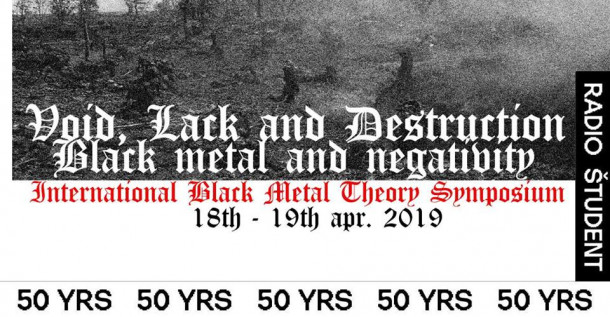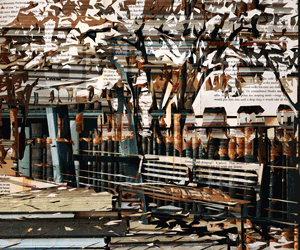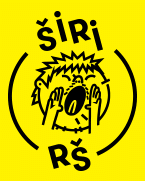Diskurzivni program RKHV: Black Metal Theory Symposium – I. dan, 3. del
Mirt Bezlaj – Of Torture and Despair
Black metal is ugly. Listening to it is unpleasant, even torturous. So why do some still chose to listen to it? I will try to find the answer to that by comparing the experience of listening to black metal with that of enjoying certain modernist art on one hand and masochistic pleasure on the other. At the same time black metal, with all its senseless violence, disdain for the body and the world and its striving towards the eternal, is a perfect example of Kant’s sublime. Yet the ethics of the sublime lead to diabolical evil instead of good. The act of listening to black metal is an act of negating the world and its laws, not in the name of eternal goodness but rather as a sovereign immoral act.
Mirt Bezlaj has recently finished MA in philosophy at the University of Ljubljana. He is working at Radio Študent, where he has, among others, published a series of broadcasts about black metal and black metal theory.
Camille Bera – Why does it sound so gloomy? A musicological approach to Black Metal’s negativity
Every metalhead has at least once in their lifetime encountered a statement in the style of: “this music sounds so gloomy, you should listen to something more uplifting, less negative”. These sort of observations make us wonder what is perceived as negative in a musical sense, compared to what sounds positive. If we consider lyrics and imagery alone, non-seasoned listeners’ negative perception seems quite obvious. But if we put those factors aside, one might wonder why the music itself sounds negative. Ranking from the sonically most noticeable negative elements to less evident aspects, and by using a musicological approach, I will attempt to highlight the factors that cause black metal to be perceived as a negative musical genre by most people, and why. To do so, the focus of my analysis will be on musical criteria only, purposefully choosing to ignore lyrics and imagery, in order to show why Black Metal is intrinsically linked to negativity. I will also strive to determine various categories of negatively perceived elements, their roles and what they represent in the listener’s mind.
Camille Béra is independent scholar. She received her PhD under the title Le Black Metal: un genre musical entre transgression et transcendance at Université de Rouen in 2018.
Primož Krašovec – Black Metal as Anti-Metal
Perhaps black metal with its sound, lyrics and iconography, is not (only) the most extreme form of metal, but rather something that at a certain point escapes metal and begins to develop as an autonomous form of music—one that is much more interesting than classic metal. This paper examines two ‘lines of flight’ of black metal.
-
If community is the bedrock of classic metal, then it is reflected both in its elementary form of organization (band) and its imagery which involves fantasies of an organic community and a noble barbaric past. Black metal, however, is misanthropic on both those levels. Ever more often, traditional bands are replaced by lone wolves or sound projects with no fixed members. Instead of resorting to vikingoid kitsch, black metal is suspicious, or even resistant, to the ideas of humanity and social connections themselves. Social anorexia vs. macho bonding.
-
The horror imagery of classic metal is based on a simultaneous eeriness and fascination with violence, demons, wars, etc. Black metal, on the other hand, explores a much more abstract dimension of horror – the cosmic senselessness and indifference. Black metal does not express a relationship between us and that which is hostile, aggressive and frightening towards us (however antagonistic, this is still a relationship). Rather, the metaphors of cold, darkness and frozen deserts, which black metal uses, represent an absolute indifference of the universe towards everything. Depressed numbness vs. warrior ardor.
P.S.: It is perhaps possible to connect both these ‘lines of flight’ to Buddhist teachings of emptiness and the impermanence of everything.
Primož Krašovec, professor at the Department of Sociology, Faculty of Arts, University of Ljubljana and a regular contributor to Šum journal and Radio Študent (Pisalni stroji).























Prikaži Komentarje
Komentiraj